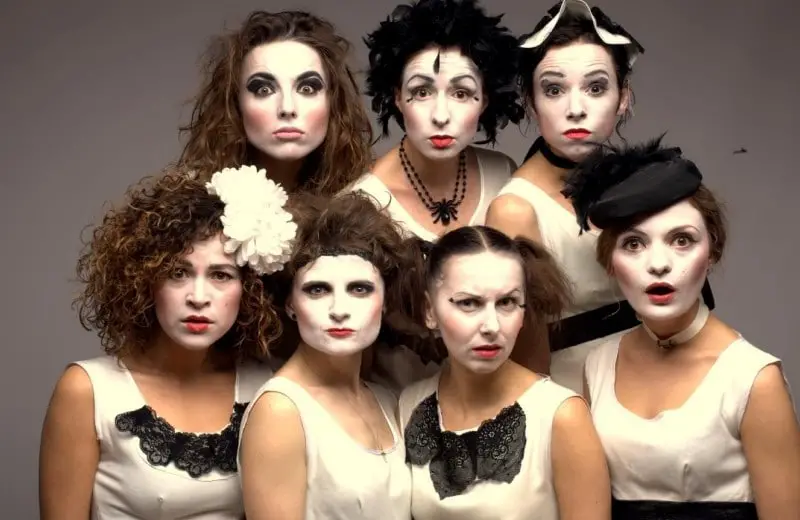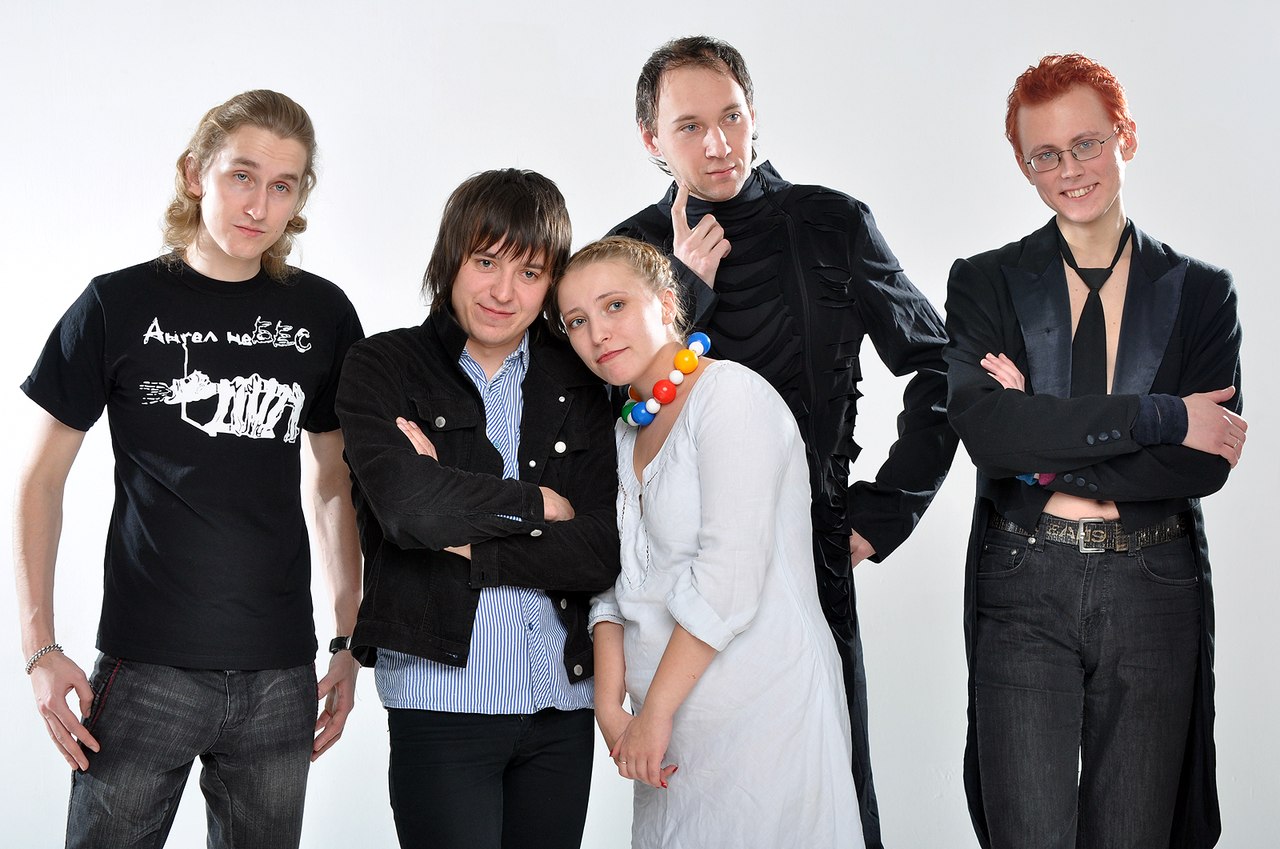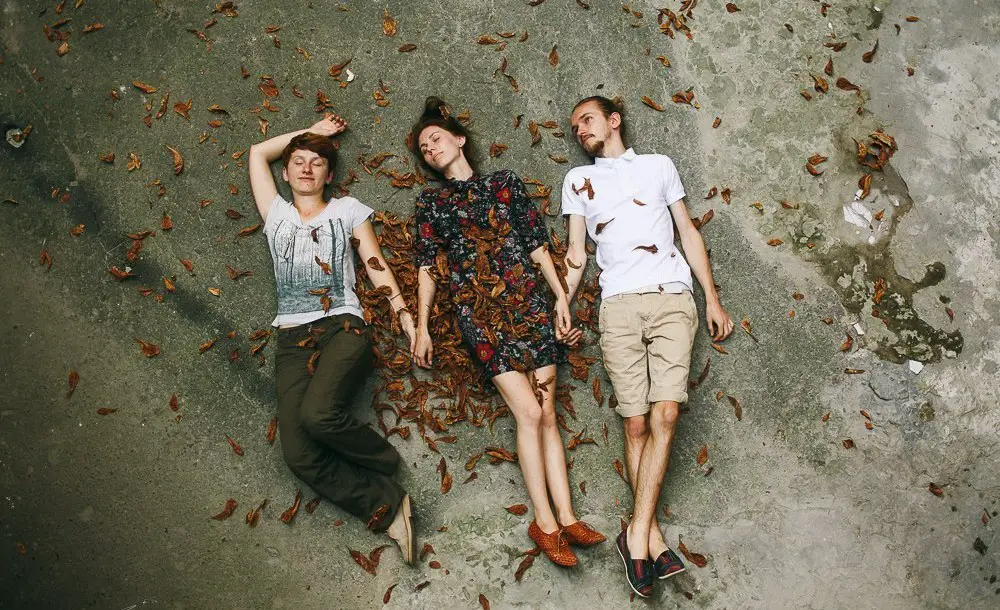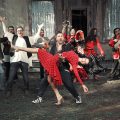A self-described “freak cabaret,” the Dakh Daughters is a Ukrainian music and theater group comprised of seven women who use dramatic make-up, old clothing, and innovative melodies to draw their audiences in. Their name derives from the Dakh Theater, which is closely tied to the group and often hosts concerts for them. The band formed from a merger of the bands Perkalaba (a Ukrainian-gypsy ska-punk band) and DakhaBrakha (a Ukrainian folk quartet). The group initially came together in 2012 as a one-night project for a festival performance in Paris, but when the dynamic of the group was well-received, they decided to remain together.
The band members play a wide variety of instruments and speak-sing in different languages and dialects to add irony and emotion to their music. Each song they perform is a mini-cabaret of “sung-spoken monologues, eerie Ukrainian folk harmonies, percussion, strings, stringed instruments turned into percussion, wailing, weeping, white face paint, moaning and gnashing of teeth.” They often use works of famous poets such as William Shakespeare, Taras Shevchenko, Joseph Brodsky, and many others in their lyrics as an inventive play on words to create an ominous, spine-tingling sound.
The band initially rose to fame in 2013 after publishing a video for the song “Rozy/Donbass” which mixed Shakespeare’s Sonnet 35 and traditional Ukrainian folk songs. This video alone captures the overall feeling from watching this group; you begin with an uncomfortable entrance and then the instruments begin as an interruption of the calm you have been lulled into. As the song progresses, the women play off of one another and their voices begin to soar above the original melody. At the end, the listener is left with the same uncomfortable feeling they began with, but with an ironic sense of peace. The strength and command of the women’s voices is intriguing and makes the listener crave more.
The group gained further notoriety after their live performance on Maidan Nezalezhnosti in Kyiv during the Euromaidan Protests in December 2013.
Since their establishment, the group has performed throughout Ukraine at numerous festivals, as well as in Poland, France, Russia, and Brazil. The group’s first studio album IF was released in November 2016 and contains 9 tracks, where each song is freakier the last.
“Rozy/Donbass” (2013)
Lyrics:
No more be grieved at that which thou hast done:
Roses have thorns, and silver fountains mud,
Clouds and eclipses stain both moon and sun,
And loathsome canker lives in sweetest bud.
No more be grieved at that which thou hast done:
Donbass
Roses have thorns, and silver fountains mud,
Donbass
Clouds and eclipses stain both moon and sun,
Donbass
And loathsome canker lives in sweetest bud.
—————-
Рости-рости барвіночку зеле-зелененький
Поклонися молоденька до своеї неньки
—————-
I’m a little lov’a
I’m a little ninja
What you gonna making
I am gonna taking
I am on I am off
I am on I am off
I am an fantastisch Donbass
Rock the microphone
Rock the microphone
Rock the microphone
Rock the microphone
Rock the microphone
—- —- —– —– —-
Rock the microphone
Rock the microphone
Rock the microphone
Rock the microphone
Диби-диби-диби-ди
Вийшла баба по гриби
Адже по опеньки
Гуляти раненько
————————
Ой куди-ж-ви голуб’ята
Тай полетите
—————————-
No more be grieved at that which thou hast done:
Roses have thorns, and silver fountains mud,
Clouds and eclipses stain both moon and sun,
And loathsome canker lives in sweetest bud.
No more be grieved at that which thou hast done:
Donbass
Roses have thorns, and silver fountains mud,
Donbass
Clouds and eclipses stain both moon and sun,
Donbass
And loathsome canker lives in sweetest bud.
Рози…Рози…Рози..Рози…
Рости-рости барвіночку зеле-зелененький
Поклонися молоденька до своеї неньки
Рости-рости барвіночку зеле-зелененький
Поклонися молоденька до своеї неньки
«Ганнуся» (2013)
Lyrics:
Це люди чужі мене тримают
Чого в мене тіко не було!
Хіба лиш потєчого молока ми бракло, а бирше биг ме нічо
А я ні маю дітей.
Перша дитинка була й остатньою.
Не маю рідні.
Є, але такі бічні, дальні.
Чоловік умер бо слабий був.
Та й поки була дужа, коровку поросє держєла,
Та й забав’єла си.
Кутала си, громадила.
А я ні годна ні коровку, нічого вже у світі.
Пенсійку маю, йой, але не дуже велику, та й то добре мені.
Треба добрих людей аби хтось добув.
Бо є ще старі, скаржаться на свої діти, я уже знаю, як там ще він так і не відає.
А є що стареня скаржиться на свої діти шо вони гаркають там усєке на них, я вже знаю як.
Та й бідувала я, так що не гараздувала, всяке було, війна…
Та я їла усякого ніякого, та й вижила.
Слава Ісусу Христу!
Слава навіки Богу сіденькому!
Йой! Йой!
Земля не може бир ше всього того держєти, а Бог — терпіти.
Усе приходит так, як приказували старовітські люди, із первовіку.
А то були мудрі віщуни!
Люди попід хмари літают, гуцули се по лєнті перебирают,
Свої звичаї полишєют, бракує лиш [архідника архєюди].
Це конєц свєту вже!
Якби я не прибагала, днину б не прожила, клянусь Богом,
Нема у мене страху, де би я не жила.
Слава Ісу,
а слаба, заслабла, сла… (бла-бла-бла-бла-бла-бла-бла!)
Нема у мене страху — тьху! (тьху!)
Перед Богом. Боже-Боже, тітка здохла, кіт не може.
Я ні грішила у життю, ні вкрала, ні убила, ні за (цей-цей)
Чоловік умер, бо слабий (бий-бий!),
Та й поки була дужа, коровку поросє держєла,
Та й забав’єла сє.
Кутала си, громадила.
Чир варила, сіно косила, милого й мила.
А тепер нема й мила (ла-ла-ла).
А я ні годна, а я ні годна, а я ні годна! (годна, годна!)
Слава Ісусу Христу!
Слава навіки Богу сіденькому!
Йой! Йой!
А як маму хоронили, комедії мали,
Впала з возу, вийшла берти, розтрощила спину.
Везли кіньми, несли вгорі бесагом на спині
Слава Богу!
Йдіть до дідька!
Шляг би вас всіх трафив!
Але мамку свою рідну не могно забувати!
Ти спи спокійно. Приходь нині, маємо танцювати.
Та для чого він мені гузиться, двері закрив, я ж йому так давала!
Так давала як пацєки зранку свою ранку. Свою ранку!
Впаде, впаде зима. Болить в мене голова!
Аби коби не той сніг, мала би гріх, мала би гріх!
Не моя провина, що сліди лишаю.
К милому прийшла, я за ним скучаю.
Мама ча, мама ча, мама ча, мама ча, мама ча, мама чая ніхачу!
Вже головю камінь, вже каменем в голову!
Лю-блю-блю-є!
Наш є суп гарячий, а який стоячий? (чий? чий?)
Голова би каменем того життю!
Пестило-любило, а тепер лиш п’ю!
Слава Ісу,
Впала — піду!
На правду не знаю як дожити, як годити!
Боженко милосердний, аби заступив нас!
Не будь такий впертий!
Слава навіки Богу сіденькому!
Йой! Йой!











